
Past Tense of Leave, Past Participle of Leave, V1 V2 V3 V4 V5 Form of Leave Leave means; Go away
Left is the past tense of the word leave. Left is the past participle of the word leave. leve past form, verb forms, v1v2v3, Infinitive

List of Past Participle Grammar Syntax
What is the past participle of "leave"? English Grammar Tenses Past. 1 Answer Diego Martínez Paz Jun 11, 2017 Left. Explanation: Examples:-David had/has left the building.-Nothing was left behind the door. Answer link. Related questions. Is past perfect the same as past participle?.

Leave Past Tense Verb Forms, Conjugate LEAVE
Simple past english left Past participle english left More information Full conjugation of "to leave" Full conjugation of "to leave" Indicative Present I leave you leave he/she/it leaves we leave you leave they leave Present continuous I

Leave Past Simple, Past Participle, V1 V2 V3 Form of Leave English Vocabs
The past tense of the verb "leave" is "left", and the past participle is "left". Verb Tenses Past simple — leave in past simple left (V2) . Future simple — leave in future simple is leave (will + V1) . Present Perfect — leave in present perfect tense is left (have/has + V3) . Past Perfect — leave in past perfect tense is left (had + V3) .

Leave Verb Forms, Base Form, Past Tense, Past Participle & V1 V2 V3 English Bodh
Grammar Reference Irregular Verbs List Definition: To Leave Irregular verb: To Leave Verb conjugation: Leave - Left - Left Meaning of 'To Leave' To go out of a place Conjugation of verb 'Leave' Subscribe to Ad-Free Browsing Enjoy a seamless learning experience without interruptions from advertisements.
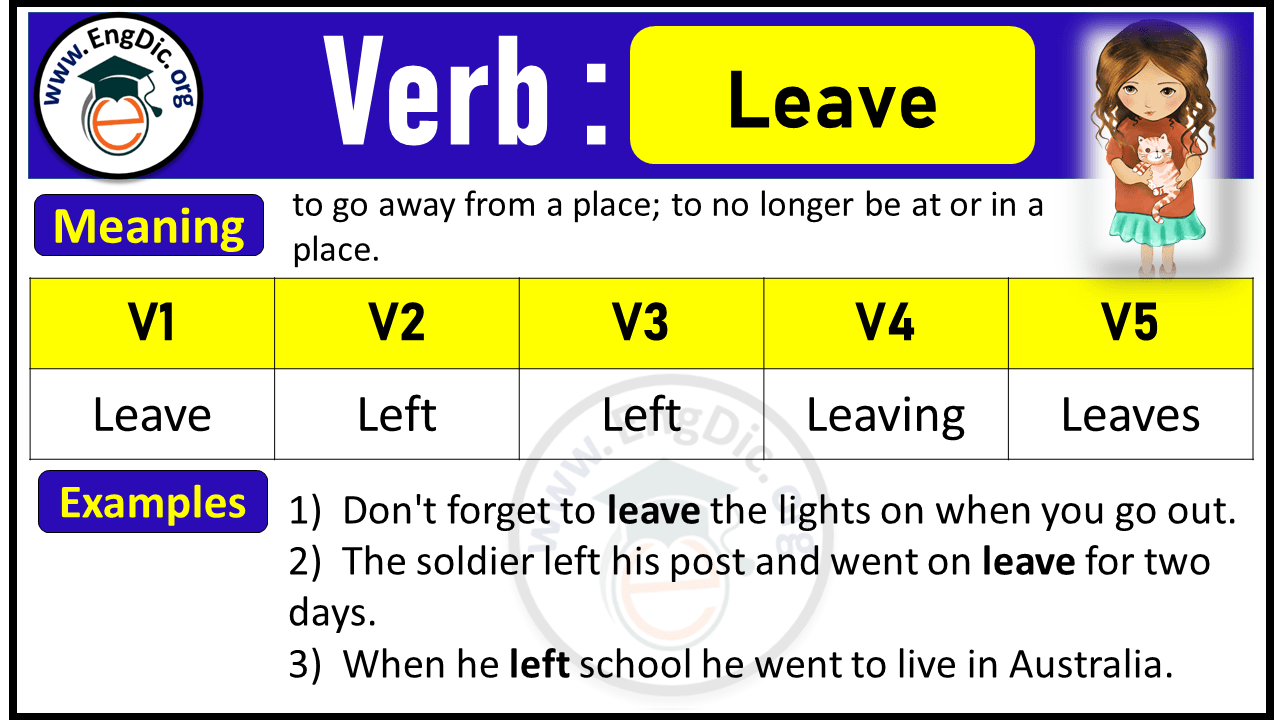
Leave past participle EngDic
past participle: (to) leave leaving left definition in Spanish in French in Italian Indicative Perfect tenses Continuous (progressive) and emphatic tenses Compound continuous (progressive) tenses Conditional Imperative Subjunctive *Blue letters in conjugations are irregular forms. ( example)
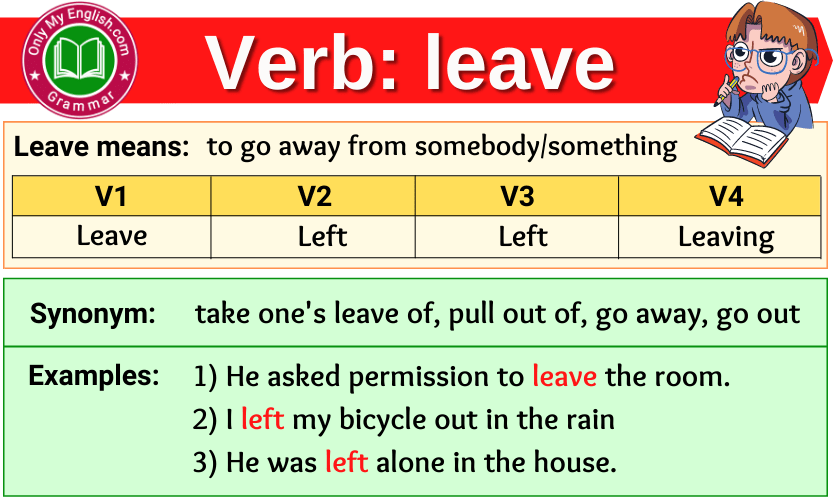
Leave Verb Forms Past Tense, Past Participle & V1V2V3
Updated on August 19, 2019. This page provides example sentences of the verb "leave" in all tenses including active and passive forms, as well as conditional and modal forms. Base Form leave / Past Simple left / Past Participle left / Gerund leaving.

Leave V1 V2 V3 V4 V5 , Past Tense, Past Participle Form of Leave EnglishAwesome
The Verb "Leave" in English Conjugation of "To Leave" The verb "leave" is an irregular verb. (This means that "leave" does not form its simple past tense or its past participle by adding "-ed" or "-d" to the base form.) The Five Forms of "To Leave" "To Leave" in All the Tenses

Conjugation Leave 🔸 Verb in all tenses and forms Conjugate in past, present and future
V3 Past Participle Past Tense of Leave We use the word ' leave ' very often in our daily life. In this lesson, we will examine the details of this widely used expression. If you are ready, let's start! Meaning The meaning of this word is going away from someone or something. Base Form Examples I leave America every year. V2 Past Simple
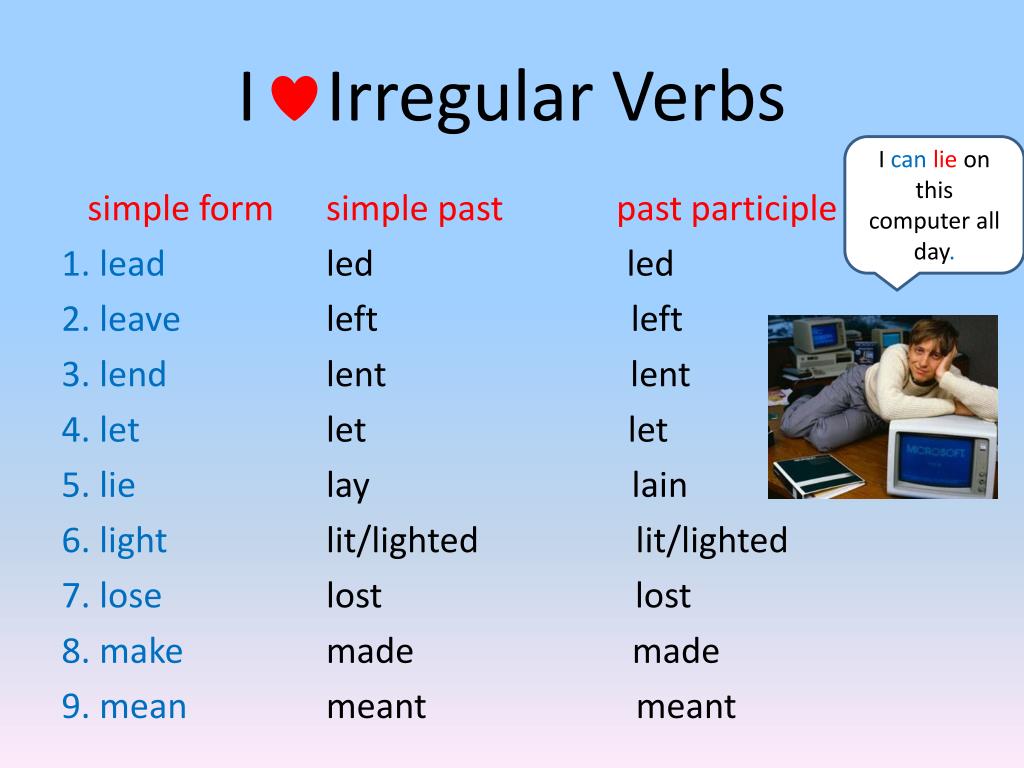
Past Tense Of Leave / See Past Simple, Simple Past Tense of See Past Participle The simple
Simple Past Tense He/She/It left. I left. You/We/They left. Past Continuous Tense He/She/It was leaving. I was leaving. You/We/They were leaving. Past Perfect Tense He/She/It had left. I had left. You/We/They had left. Past Perfect Continuous Tense He/She/It had been leaving. I had been leaving. You/We/They had been leaving. Simple Future Tense

Leave Past Tense Best English Listening Podcast English Made Simple
Past Participle left Present Participle leaving Present I leave you leave he/she/it leaves we leave you leave they leave Present Continuous I am leaving you are leaving he/she/it is leaving we are leaving you are leaving they are leaving Present Perfect I have left you have left he/she/it has left we have left you have left they have left
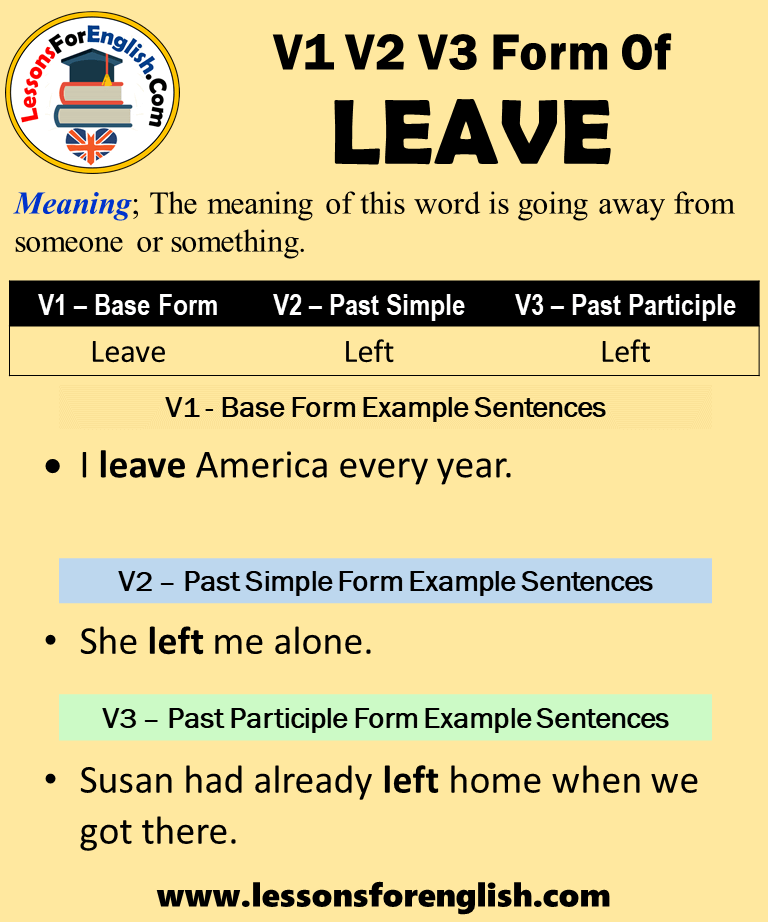
Past Tense Of Leave, Past Participle Form of Leave, Leave Left Left V1 V2 V3 Lessons For English
Leave Present Participle: Present Participle Form of Leave is Leaving. Example: Sarah is leaving the parcel. Leave 3rd Person Singular: 3rd Person Singular of Leave is Leaves. Example: Sarah leaves the parcel.

Leave Past Tense, Present and Future Conjugations, Leave V1 V2 V3 in 2022 Past tense, Simple
Conjugate the verb leave in all tenses: present, past, participle, present perfect, gerund, etc.

Little Moon Leave PresentPastPast Participle TenseVerb Forms YouTube
Past participle left Model : leave Auxiliary : have, be Other forms: leave oneself / not leave Contractions Advertising Indicative Present I leave you leave he/she/it leaves we leave you leave they leave Preterite I left you left he/she/it left we left you left they left Present continuous I am leaving you are leaving he/she/it is leaving
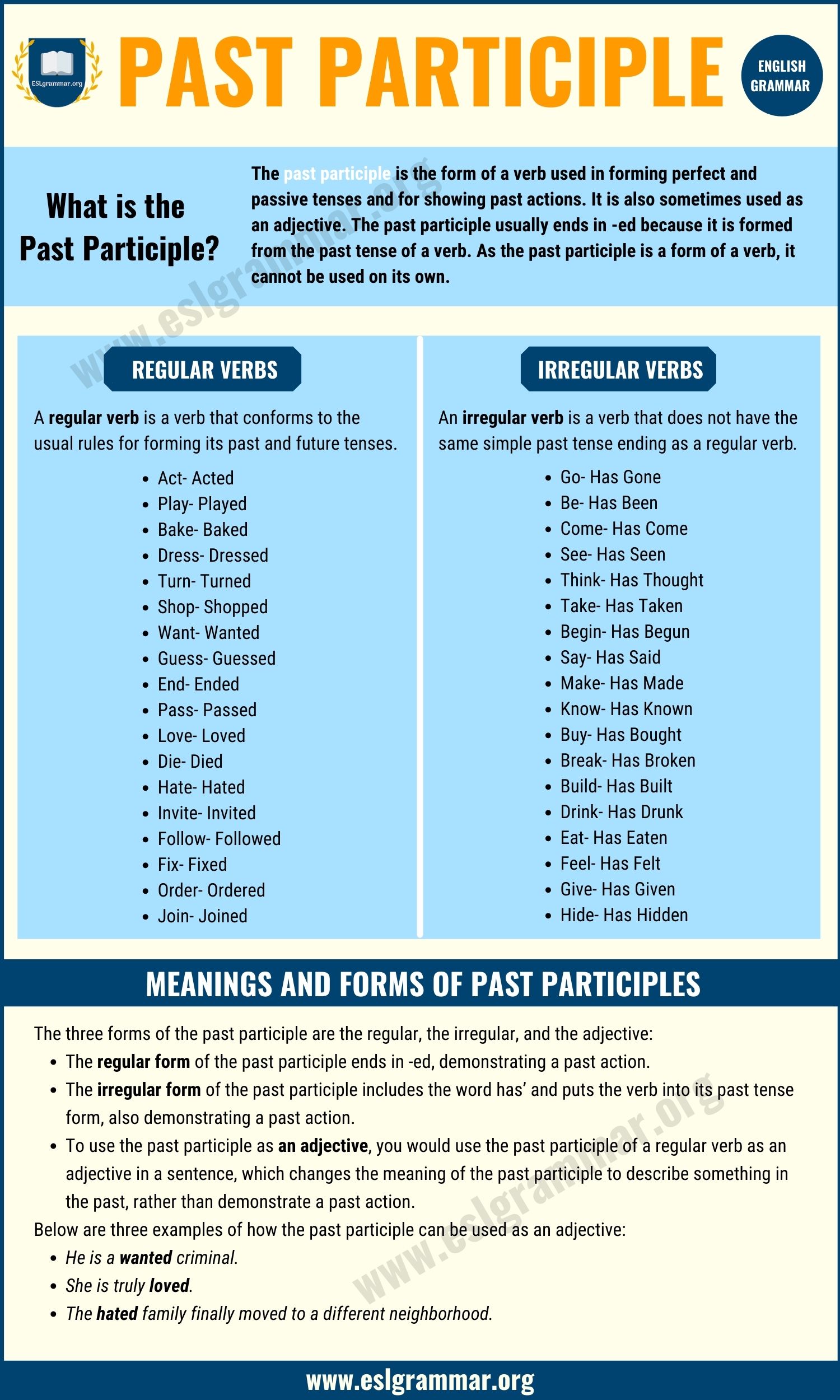
Past Participle Meanings and Different Forms of Past Participles ESL Grammar
What is the past tense of the word "leave" The past tense (past participle) form of "leave" is "left." The infinitive of the word form is "leave." The present participle form is "leaving." The past tense form is "left" and past participle form is "left." Understanding verb tenses The general grammar rules that govern past tenses are as follows.

Quit Past Simple, Simple Past Tense of Quit, Past Participle, V1 V2 V3 Form Of Quit When
The past simple and the past participle of leave. Conjugation of the verb leave: Base Form/Infinitive without 'to': leave. Past Simple: left. Past Partciple: left. Present Partciple: leaving. Third Person Singular: leaves. Definition: 1. To go away from. 2. Not to take something or someone with you when you go